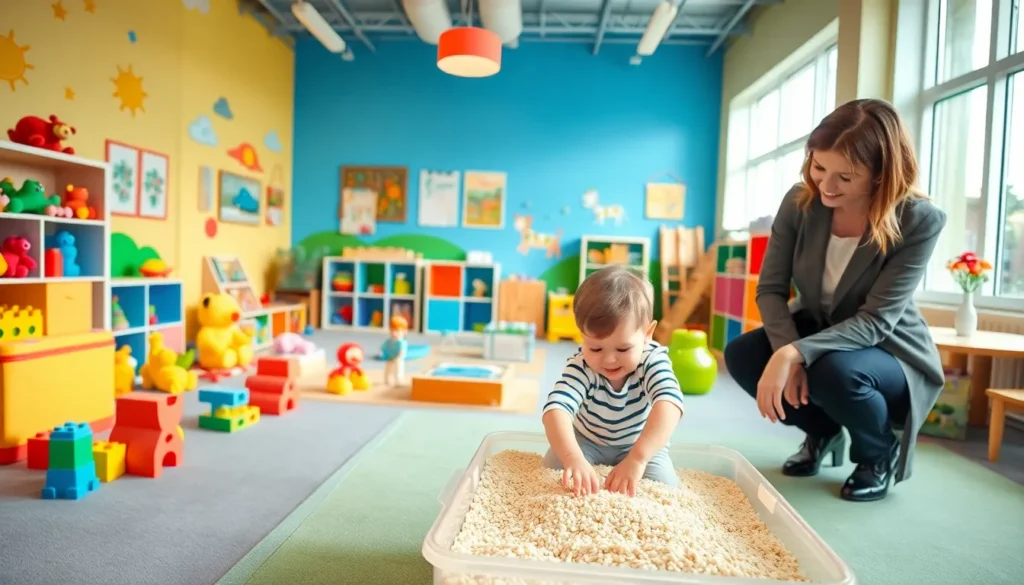In today’s world, co-parenting can sometimes feel like trying to complete a jigsaw puzzle with half the pieces missing. The good news? Co-parenting therapy exists to help those navigating through these turbulent waters. If you’re thinking about co-parenting therapy, stop right there. This article is your golden ticket to understanding what it is and how it can turn chaos into collaboration. Don’t worry, there won’t be any awkward couch sessions, just practical advice and maybe a funny story or two.
Table of Contents
ToggleUnderstanding Co-Parenting Therapy

Co-parenting therapy is not just about talking it out: it’s a structured approach aimed at helping parents communicate more effectively post-separation or divorce. The core idea revolves around assisting parents in creating a stable, supportive environment for their children even though the challenges of being apart. Imagine bringing both parents together, not for a dinner date, but for constructive dialogue to foster healthy co-parenting dynamics. This often involves sessions led by a trained therapist who understands the unique complexities of co-parenting relationships. Parents work through their emotional hurdles, learn how to put their children’s needs first, and, in the process, they cultivate a cooperative spirit that benefits everyone involved.
Benefits of Co-Parenting Therapy
So, why opt for co-parenting therapy? The benefits can be as numerous as the benefits of avocado toast. Here are a few of the most compelling reasons why parents might consider the therapy path:
Improved Communication
One of the biggest challenges in co-parenting is communication. Therapy sessions provide a neutral space to share feelings and thoughts honestly. Think of it as a translator for co-parenting : the therapist helps decode misunderstandings into clear, compassionate dialogue.
Conflict Resolution
Fighting over schedules, holidays, or even whose turn it is to do laundry can escalate quickly. Therapy equips parents with conflict resolution tools. This way, disagreements can be managed calmly rather than erupting into full-blown battles in front of the kids.
Focused on the Children
The ultimate goal of co-parenting therapy is the well-being of the children involved. By participating in therapy, parents shift their focus away from their grievances towards what truly matters: raising happy, well-adjusted kids.
When to Seek Co-Parenting Therapy
Timing is everything, right? Waiting until things spiral out of control can be tempting, but co-parenting therapy can be beneficial even when things seem manageable. Here’s when to consider reaching out:
- Post-Divorce Transition: Right after separation can be a whirlwind. Therapy can provide clarity during this shaky time.
- Frequent Conflicts: If disagreements arise more often than not, it might be time to seek help.
- Changes in Dynamics: Major life changes, like moving or a new partner, can disrupt the co-parenting process. Therapy can guide families through these transitions gracefully.
- Child Behavioral Issues: If children start acting out, therapy can help the parents align their strategies, showing a united front.
What to Expect in Co-Parenting Therapy Sessions
Curious about how these sessions really go down? They typically involve both parents meeting with the therapist for a discussion tailored to their specific situation. Here’s what to expect:
Initial Assessment
In the first session, the therapist may conduct an initial assessment to understand the co-parenting dynamics better. Expect questions about the history of the relationship, the current co-parenting arrangement, and any specific issues at hand.
Goal Setting
The next step often involves setting mutual goals. Goals can range from learning better communication techniques to specific parenting strategies that support the children’s emotional health.
Techniques and Role-Playing
Therapists frequently use role-playing scenarios to help parents practice new communication strategies in a safe setting. This requires a bit of courage, but parents often find this technique enlightening.
Techniques and Approaches Used in Co-Parenting Therapy
Co-parenting therapy employs various methods and techniques tailored to suit different family dynamics. Here are some common approaches:
Emotionally Focused Therapy (EFT)
EFT helps parents identify and express their feelings toward one another. Recognizing emotional triggers can lead to more empathetic interactions.
Cognitive Behavioral Therapy (CBT)
CBT is often used to address negative thought patterns. Understanding how one’s thoughts influence their feelings and actions can help parents modify their behaviors in co-parenting situations.
Mediation Techniques
Therapists may suggest mediation strategies that encourage collaboration in decision-making. The focus here is on problem-solving rather than assigning blame.
Finding the Right Therapist for Co-Parenting
Choosing the right therapist can feel like dating without the commitment. Here are some tips to help find a suitable co-parenting therapist:
- Look for Specialization: Not every therapist specializes in co-parenting. Look for someone experienced in family dynamics and co-parenting.
- Check Credentials: Credentials matter. Verify their qualifications and experience in dealing with post-separation issues.
- Listen to Recommendations: Personal referrals are gold. Ask friends or family for recommendations, or check online reviews.
- Have a Consultation Meeting: It’s usually beneficial to schedule a consultation to feel out the therapist’s style before committing.




